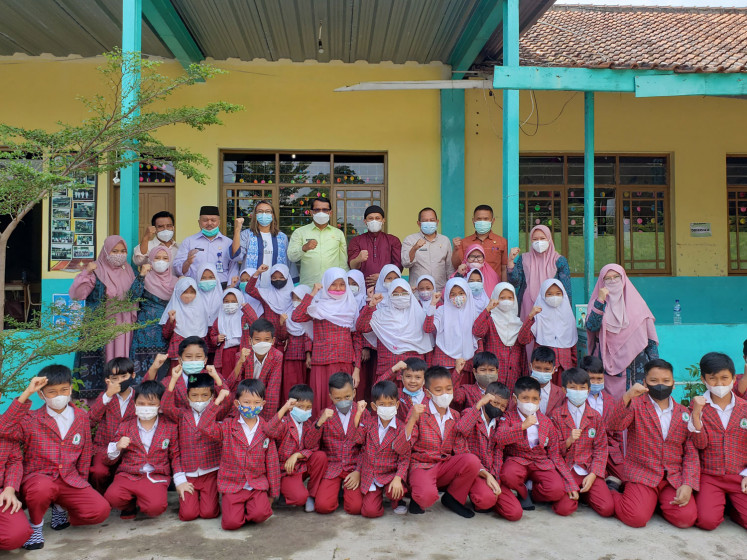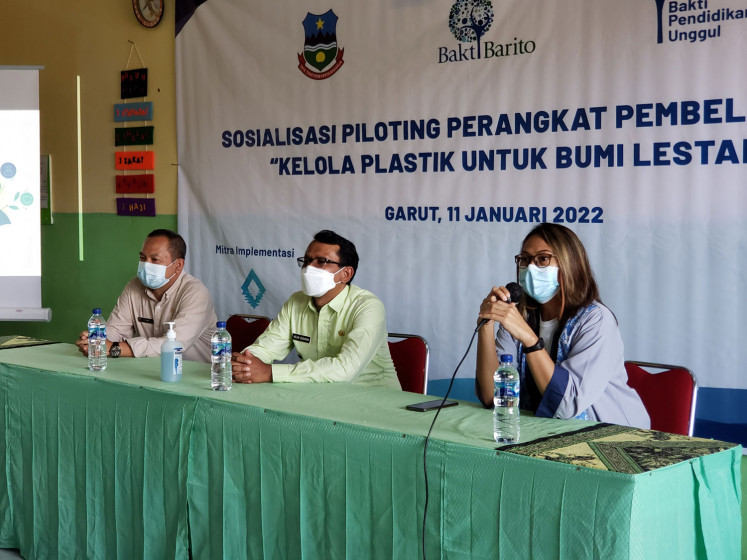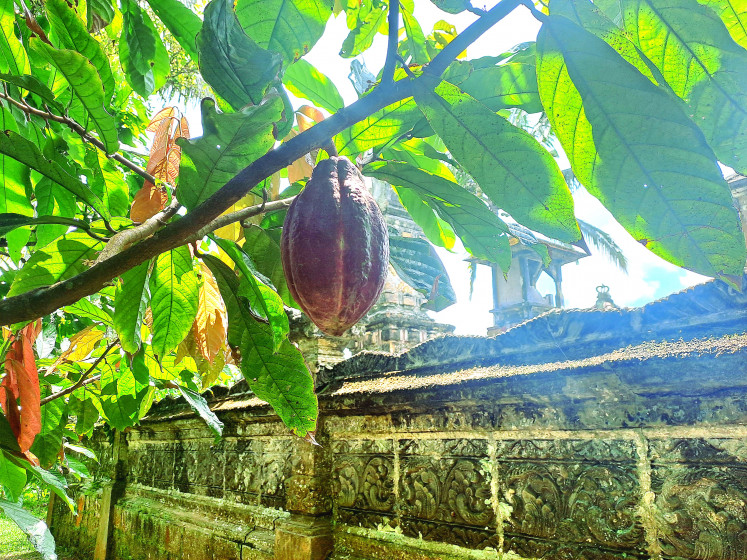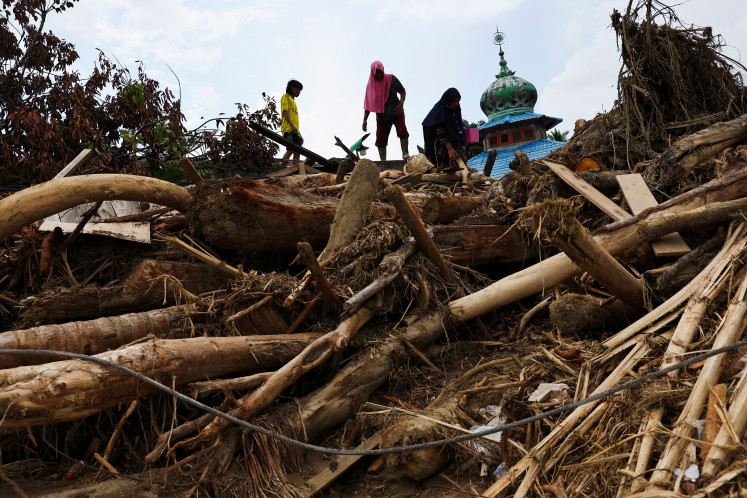Popular Reads
Top Results
Can't find what you're looking for?
View all search resultsPopular Reads
Top Results
Can't find what you're looking for?
View all search resultsBakti Barito Foundation focuses on instilling sustainability values
The presence of a large corporation should be geared toward making a sustainable impact on the surrounding area by responding to the arising concerns pertaining to people and the environment.
Change text size
Gift Premium Articles
to Anyone
T
he presence of a large corporation should be geared toward making a sustainable impact on the surrounding area by responding to the arising concerns pertaining to people and the environment. Such a view has long been embedded in Bakti Barito Foundation, which operates on behalf of Barito Pacific Group.
For Bakti Barito, people’s increased awareness about sustainability is also of equally paramount importance to ensure that the foundation and related stakeholders can collaborate to implement programs, which help the government raise people’s welfare and preserve the environment in accordance with the Sustainable Development Goals (SDGs).
“We focus on instilling sustainability values in people, industry and communities surrounding our operational sites,” said Fifi Setiawaty Pangestu, chairwoman of Bakti Barito Foundation in an interview in Jakarta recently.
Fifi pointed out that one of the functions of the foundation was to coordinate and monitor programs for all companies under the management of Barito Pacific Group in order to align with the SDGs, a universal call to action to end poverty, protect the planet and ensure that by 2030 all people enjoy peace and prosperity, and also to reach out wider areas.
Barito Pacific Group’s main subsidiaries include PT Chandra Asri Petrochemical Tbk and Star Energy Geothermal. The Group started to shift its core business from forestry to petrochemical and energy decades ago to tap into Indonesia’s growing mid-stream petrochemical industry and the country’s cleaner energy backed by more conscious consumer demand.
Bakti Barito was established in 2011 to represent its founders, Bapak Prajogo Pangestu, with a vision to help Indonesian people develop and conserve the environment as a form of contribution and having a greater impact on society, or “what we frequently call ‘delivering impact beyond returns’,” Fifi remarked.
“We have two functions, first as a foundation owned by the family of Bapak Prajogo Pangestu in delivering humanitarian aid for natural disasters and social donations. Second, as a foundation owned by a corporation, Barito Pacific Group, with its corporate social responsibility (CSR) initiatives,” she explained.
When it comes to programs, Bakti Barito focuses on four pillars, namely education, environment, economy and society. “The sustainability pillars serve as a starting point that Bakti Barito uses in undertaking its CSR programs,” Fifi said.
Explaining the flagship programs and their impacts, Fifi revealed that Bakti Barito had devised programs that encouraged awareness and behavioral change in children on responsible consumption, through among other things, the management of waste including plastic waste and circular economy and also promoting integrated farming for food security purposes.
Bakti Kelola Lingkungan Program
One of the ongoing programs is Bakti Kelola Lingkungan (Environmental Management Initiative). The program provides room for elementary school (SD) teachers to advocate and educate children about responsible consumption and how to manage trash, including plastic waste recycling. Bakti Barito collaborates with the Education and Culture Ministry, such as in preparing learning toolkit modules related to responsible consumption and plastic waste management. The toolkit will also be included in the newest release of National Curriculum Platform, Merdeka Mengajar as part of science module for elementary school.
“The approach that we adopt is how to make complicated lessons easier and make them into easy modules to learn and understand,” Fifi said.
The Bakti Kelola Lingkungan Program, held in 11 elementary schools in Cilegon, Garut and Jakarta together with Chandra Asri and Star Energy Geothermal, is expected to support the government’s goal to reduce 70 percent of unmanaged waste and enhance teachers’ capacity.
“The programs also aim to encourage people to participate in implementing responsible consumption and post-consumer plastic waste management through the adoption of the circular economy concept and certainly, Bakti Barito can contribute to zero plastic waste in supporting the government’s endeavors to reduce marine plastic leakages in Indonesia by 2025,” Fifi asserted.
The educational program is aligned with the National Plastic Action Partnership (NPAP) under the coordination of the Office of the Coordinating Maritime Affairs and Investment Minister, in which Bakti Barito sits as a working group tasked with behavior change.
In his opening speech at a teacher training program called “Plastic Management for Sustainable Earth” organized by YPWKS IV elementary school in Purwakarta, Cilegon city recently, Mayor Heldy Agustian stated, “I really appreciate the activities conducted by Bakti Barito and Chandra Asri to encourage behavioral change, which will give birth to a tradition, embracing new habits, because as far as we know, even in developed countries, embracing new habits remains a challenge despite the available trash bins.”
He went on to say, “By engaging teachers in the program as a mentor, it is expected that teachers will make ‘keeping clean’ as their embedded habit and can pass on it to their students. It is important for teachers to know how to ‘manage yourself’ and ‘how to manage your people’ because a teacher serves as a role model for students in a school.”
Bakti Barito director Dian Purbasari said, “We are pleased that teachers and students implemented the program enthusiastically. The learning module is expected to help the overall apparatus at schools, especially students to care about the environment.”
Dian said that through the learning module, the students could learn how to use plastic in a wise manner and how to manage and make use of used plastic waste. “All of the presented learning materials are suited to the elementary school’s learning modules complete with videos and games, enabling students to learn interactively,” she said.
In carrying out the initiative, Bakti Barito also collaborates with STKIP Surya, which is responsible for preparing the educational materials or learning modules, and Vital Ocean Indonesia Foundation as advocacy partner.
“In addition to that, we also run an environmental program that is closely related to the area of education, namely Revitalization of Vocational Education in Agriculture, in which Bakti Barito also partners with community-based organizations The Learning Farm and Joglo Tani to advocate an integrated agriculture,” Fifi revealed.
One of the activities is teaching vocational school students about the modern, integrated, pesticide-free and more sustainable agriculture, according to her.
In the social area, Bakti Barito also participates in assisting the government and the people in coping with the impacts of the COVID-19 pandemic by donating a range of health devices, PCR tests, medicines and so forth.
“We emphasize the spirit of collaboration that serves as a basis for all our collaboration with other parties. One thing we don’t want is to ‘reinvent the wheel’, we always seek good partners that can work together with us to develop Indonesia,” Fifi concluded.
So, what Bakti Barito has done and is doing, especially when it comes to participating in helping the government achieve SDGs, may inspire other corporations to follow suit.












